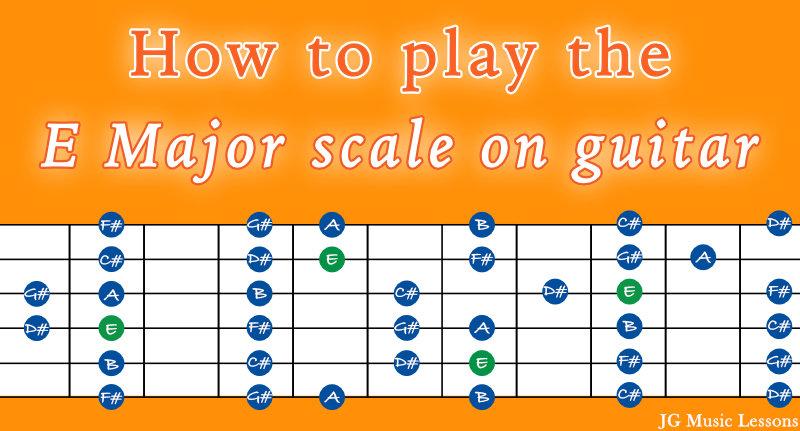The E Major scale is one of the essential scales to know on guitar. You might have learned it in the first position of the guitar, but now you want to learn the same set of notes throughout the fretboard. This lesson covers the 5 scale shapes for effectively playing the E Major scale on guitar.
If you still aren’t confident about naming the notes on the guitar, I recommend checking out these 7 tips to learn the notes on the fretboard. Grab your guitar and let’s get started!
E Major scale theory
To help you understand the E Major scale, let’s first go over some music theory before playing it. The E Major scale has the notes E, F#, G#, A, B, C#, and D#. These notes come from the Major scale formula which has specific steps between each note (whole, whole, half, then whole, whole, whole half step).
See the whole and half step formula with the E Major scale notes below.

You can also think of the notes in the Major scale in terms of intervals related to the root note. The intervals in a Major scale are unison (with the root note), perfect 2nd, Major 3rd, perfect 4th, perfect 5th, Major 6th, and Major 7th.
Another method that you can use to learn any Major scale is to memorize the key signature. In this case, the E Major scale has 4 sharps which are F#, G#, C#, and D# (same as the C# minor scale).
How to read the scale charts
For the charts below:
- Lowest horizontal line represents the thickest string (Low E) and the top horizontal line represents the thinnest string (high E).
- The green circles represent the root note of the Major scale and blue notes are every scale note in between.
- Circles to the left of a chart represent open strings.
If needed, check this link for more on how to read guitar notation symbols.
E Major scale using open strings
To get started, here is a practical way to play the E Major scale using open strings. You’ll see the music notation including guitar tabs for all the scale shapes in this lesson.
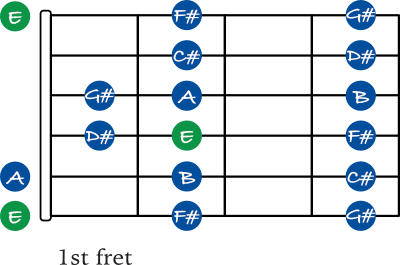
For the notation below, the numbers above the notes suggest what fingers to use for your fretting hand.

5 E Major scale shapes
This section shows you the E Major scale in five different areas of the fretboard using all fretted notes. Afterward, you’ll see how all of these shapes connect.
E Major scale shape 1
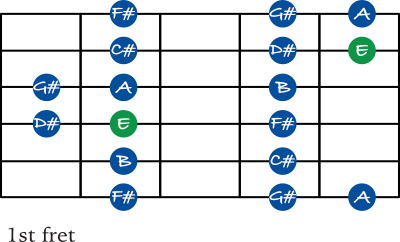

E Major scale shape 2
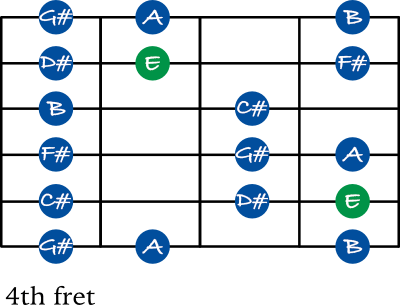

E Major scale shape 3
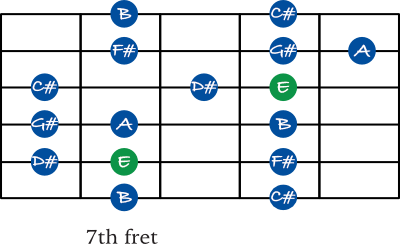

E Major scale shape 4
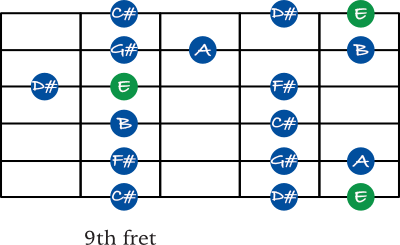

E Major scale shape 5
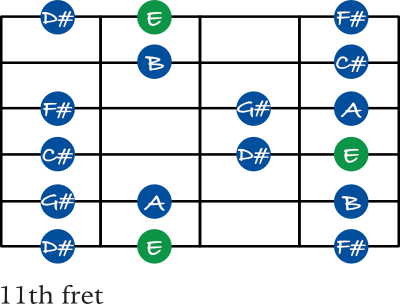

You can also apply these Major scale shapes by shifting them to any key. Make sure to rearrange your fingers wherever necessary.
All the E Major scale notes on the fretboard
Finally, here are all of the E Major scale notes on the fretboard below. This is essentially all of the scale shapes connected.

You can also check out this other lesson to learn the E minor scale on guitar.
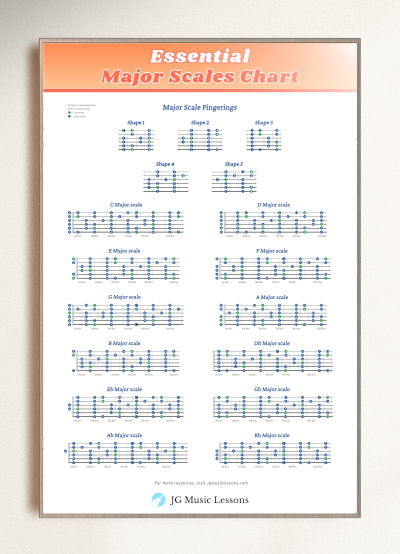
3 tips for memorizing the Major scale shapes
Here are 3 quick tips to help you memorize the 5 Major scale shapes.
1. Master one shape at a time
The way I recommend learning and memorizing any scale is to start memorizing one particular shape that feels most comfortable for you. Try to really get the shape under your fingers to the point where you don’t have to look at the chart. Use the first shape you master as a guide to learn the other scale shapes around it.
2. Look for repeating fingering patterns
Look for patterns such as what strings repeat the same fingering within a shape.
Tip: The notes on the first and sixth string will always be the same.
For example, in shape 2 we see that the 1st, 2nd, and 6th string follow a 1, 2, and 4 finger pattern. The 4th and 5th string follow a 1, 3, and 4 finger pattern. The 3rd string has the unique finger pattern of fingers 1 and 3. Knowing where note patterns repeat will help you build a mental map of a scale shape.
3. Connect shapes around the ones you learned
After learning one of the scale shapes well, either learn the shape that comes before or after it to see how the notes connect on the fretboard. Again, try to master one shape at a time and make sure you can play it without looking at the chart. This will make the process more approachable by breaking it down into smaller sections before moving on to the next shape.
Wrapping up
The goal is to be able use these scale shapes to make music and be able to play single note phrases or melodies in a variety of ways. The scale shapes can help you create new ideas and allow you to play more comfortably when changing your range of notes or when playing in different keys.
Try to practice this scale with good timing by using a metronome (here’s a free metronome on our site). If you need help on what to do next, I recommend checking out this lesson on how to practice scales on guitar.
📘 Get the free guitar practice guide here!

